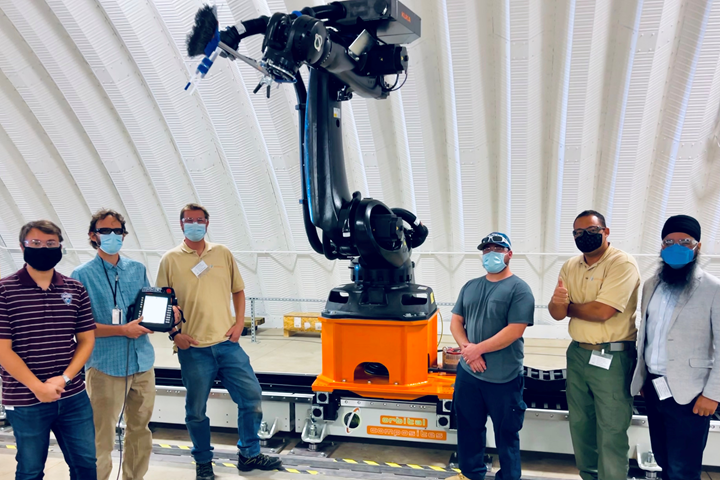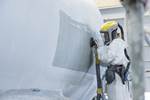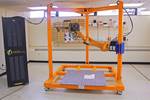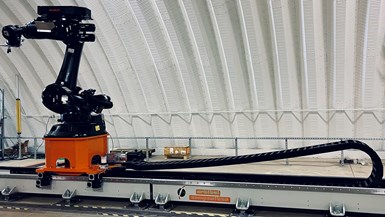Orbital Composites installs robotic manufacturing system at NREL for wind turbine blade research
Customized, automated platform expands NREL’s capabilities for researching blade-finishing technologies and serves as Orbital’s sounding board for applicable composites solutions in aerospace, space and infrastructure.

Orbital Composites and NREL team with installed robotic system. Photo Credit, all images: Orbital Composites
Orbital Composites (San Jose, Calif., U.S.) has installed a large robotic system within the National Renewable Energy Laboratory’s (NREL, Golden, Colo., U.S.) Composites Manufacturing Education and Technology (CoMET) facility. The NREL research team has won multiple awards from the U.S. Department of Energy (DOE) to prototype and validate innovative blade-finishing technologies (read more “NREL explores novel manufacturing approach for next-generation wind turbine blades”).
The installation includes a 2.5-meter reach, 300-kilogram payload KUKA (Ausburg, Germany and Shelby Township, Mich., U.S.) robot, mounted on an eight-meter track from Güdel (Langenthal, Switzerland). According to Orbital, the track was customized to meet the requirements of the chosen KUKA robot and NREL’s safety and precision standards. While the newly installed robot will provide a larger platform for automation research, expanding NREL’s capabilities for researching blade-finishing technologies, Orbital says the track is designed for aerospace-quality production.
“The composite manufacturing research team at NREL is excited to have our new robotic system, configured and installed by Orbital Composites,” says NREL research engineer David Snowberg, who facilitated the implementation of this platform at CoMET. “The procurement and commissioning of this robotic system from Orbital Composites was a seamless partnership experience for our team. We look forward to using this new robotic system in NREL’s CoMET facility for multiple research projects and continuing to build our collaboration with Orbital Composites for additional automation capabilities. We anticipate modifying the system for additive manufacturing [AM] applications in the future.”
The customized system has the ability to move robots up to six tons and guarantees the stability of robot motion in all directions.
A few challenges overcome during the installation include precision alignment of the Güdel track and accurate robot and track system calibration. While Orbital’s primary focus is building large-scale robotic AM systems, this project highlights the company’s focus on solving customers’ research priorities by building robotic systems that allow flexibility, customization and multi-functional capabilities, even for applications other than AM.
“Our goal is to tailor research and production equipment to the goals of our partners and customers,” says Cole Nielsen, founder and CTO of Orbital Composites. “Robotics automation is key to efficiency and cost effectiveness for wind blades manufacturing, which is crucial for expanding low-cost renewable energy.”
The collaboration promises to further Orbital and NREL’s shared goal of developing a sustainable energy future. Orbital says it also plans to take what is learned from wind energy markets and apply them to aerospace, space and infrastructure markets, where more-cost effective solutions are needed for manufacturing large composite structures.
“This project is hopefully just the beginning of our collaboration with NREL,” says Amolak Badesha, CEO of Orbital Composites. “We look forward to potential further collaborations with NREL in advancing large-scale manufacturing of wind turbine blades and helping to accelerate the deployment of wind energy in the U.S.”
Related Content
-
ECOHYDRO project to enable recyclable composites for hydrogen storage
With the involvement of two schools from the Institut Mines-Télécom, the 4-year project aims to improve the intrinsic properties of a composite material based on Elium via four concrete demonstrators.
-
Honda begins production of 2025 CR-V e:FCEV with Type 4 hydrogen tanks in U.S.
Model includes new technologies produced at Performance Manufacturing Center (PMC) in Marysville, Ohio, which is part of Honda hydrogen business strategy that includes Class 8 trucks.
-
Hexagon Purus opens new U.S. facility to manufacture composite hydrogen tanks
CW attends the opening of Westminster, Maryland, site and shares the company’s history, vision and leading role in H2 storage systems.











.jpg;maxWidth=300;quality=90)





